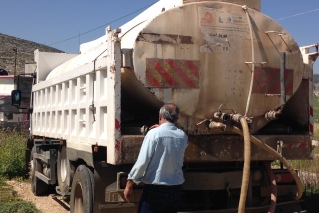
On January 25, 2016, ACRI, together with residents of the Palestinian village of Al-Aqabah and Bimkom-Planners for Human Rights, submitted a petition to the High Court of Justice, demanding that the Al-Aqabah village be connected to the water supply.
Al-Aqabah is a West Bank village located in the northern part of the Jordan Valley, with a population of approximately 200 people. According to the Oslo Agreement it is considered part of Area C, which is under full Israeli control. Despite huge obstacles and challenges, the people of Al-Aqabah have succeeded in creating a close-knit community that provides education, health services and employment opportunities for its members.
Since its establishment during the Ottoman period and until today, Al-Aqabah’s residents have relied on farming cattle and on agriculture for their livelihood. In the past, the residents relied on water wells, and would wander to live near local springs in the hottest summer months. Since 1967, the Israeli occupation has greatly limited the local Palestinian population’s access to water, and their ability to yield water from various sources including the Jordan River, natural springs in the area, and the eastern aquifer. The harsh realities of having limited access to water, are shared by Palestinian residents across the Jordan Valley.
The military’s Civil Administration has refused Al-Aqabah’s request to be connected to the water system time and time again; arguing that only a village that has a “planning prospect” should be connected to the water system. However the residents of Al-Aqabah have repeatedly submitted master plans, which would authorize and regulate the building and development of the village. Each one of those attempts failed. Instead, the Civil Administration repeatedly issued demolition orders for homes and structures in Al-Aqabah. Relatively few demolition orders were executed.
The military’s refusal to authorize a plan for the village is still used as a pretext for not connecting the village to the water system. In light of the military’s ongoing refusal, Al-Aqabah’s residents attempted to create a pool for storing rainwater, which was then demolished by the army. In contrast, nearby Israeli settlements – as well as Israeli outposts in the area that are considered illegal by the Israeli authorities themselves – are all connected to the water system. The residents enjoy large amounts of water at subsidized prices, which enables agriculture to prosper in these settlements.
Without a connection to the water system, each family in Al-Aqabah needs to create their own water supply and storage, mainly relying on water purchased from nearby Palestinian villages. The water is bought at a price three times higher than its original cost, to cover additional expenses such as pumping and driving. The high water prices force residents to limit their water consumption to a standard that is much lower than that recommend by the World Health Organization. Living with such limited water supply violates the residents’ right to live in dignity, and harms their health and livelihood. A water expert who recently examined the water used in Al-Aqabah concluded that it was not safe for drinking, and was particularly harmful to children.
The right to water is enshrined in International human rights law and in International Humanitarian Law. It was also recently acknowledged as a basic right by Israeli courts. The military’s refusal to connect Al-Aqabah to water violates the residents’ basic rights, and contradicts the occupying power’s obligations to the protected people living under occupation.
For more information:
Right to water in the OPT – Legal Background
Excerpts from the 2016 petition (in English)
January 2016 petition (in Hebrew)







